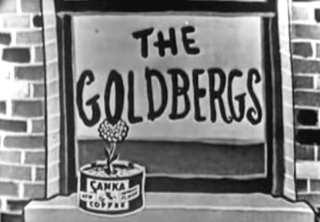In the just-so story that Americans learn about television, it all started in the fifties, with Lucy Ricardo wailing “Waaaahhh!” in her brownstone on East Sixty-eighth Street. The family sitcom was the mass medium’s primal format, the source of both brash marital farces like I Love Lucy and The Honeymooners and blander offerings like Father Knows Bestand The Adventures of Ozzie and Harriet, placid fantasias of white suburban conformity, with rock-jawed commuter dads and moms vacuuming in pearls. Each decade, new neighbors moved in: in the seventies, the Bunkers and the Brady Bunch; in the eighties, the Cosbys and the Conners. The small screen became a mirror that your own family could gaze at, to catch a glimpse of another family, seated on their own sofa, in front of their own TV.
The Goldbergs were the first of these reflections. Sweet, sharp, and a little schmaltzy, the show was set in a world of Jewish immigrants—rag-trade workers, bighearted housewives, crowds of cousins and assimilated children crammed into tenement kitchens, with kreplach sizzling on the skillet. Yet, despite the cultural specificity, Molly, Jake, and their children, Rosalie and Sammy (known as Sameleh), were portrayed not as ethnic exotics or vaudevillian “types” but as ordinary Americans, patriotic and emotionally relatable—a provocative idea in a period when Jews were widely viewed as outsiders at best, subversives at worst.
When The Goldbergs disappeared, so did the legacy of Berg herself, the first “showrunner” of any gender and a lifestyle influencer fifty years before Oprah or Martha Stewart. By 2013, the memory of Berg had been so fully eclipsed that when ABC launched a new family sitcom called The Goldbergs—written by the unrelated Adam F. Goldberg and based on his adolescence in nineteen-eighties suburban Philadelphia—few people even registered the echo.
Berg, like many Jews of her generation—including my own grandmother Malka, known as Molly, who passed through Ellis Island the year The Goldbergs débuted on the radio—had been a fierce optimist about America, a true believer in cultural progress and in a democracy that opened its heart to new arrivals. But, in the end, Berg’s life became proof of a darker truth, one that is newly relevant in the Trump era: doors that swing open can also slam shut.
There have been a few attempts, in recent years, to fly Berg’s flag again, including a 2007 scholarly biography by Glenn D. Smith, Jr., and, in 2009, Aviva Kempner’s lively, affectionate documentary Yoo-Hoo, Mrs. Goldberg, featuring interviews with Berg’s family and colleagues. In 2021, Jennifer Keishin Armstrong published the excellent When Women Invented Television, which skillfully wove Berg’s story into those of three other neglected innovators: Irna Phillips, the creator of the soap opera; the Black jazz chanteuse and DuMont-network TV host Hazel Scott; and Betty White (less forgotten, although few people know she basically invented the TV talk show).
